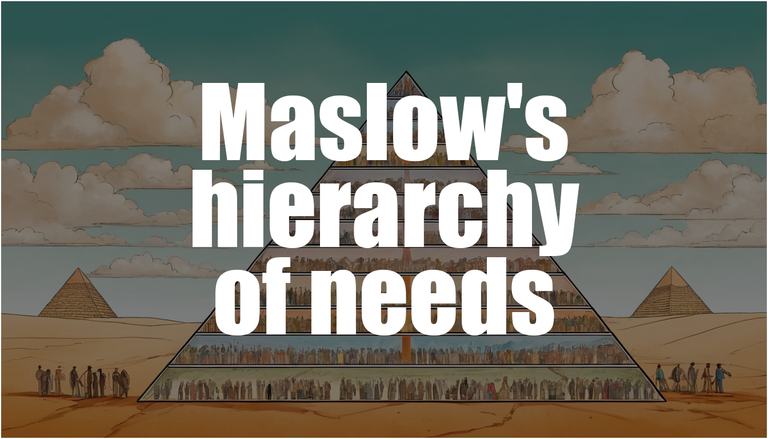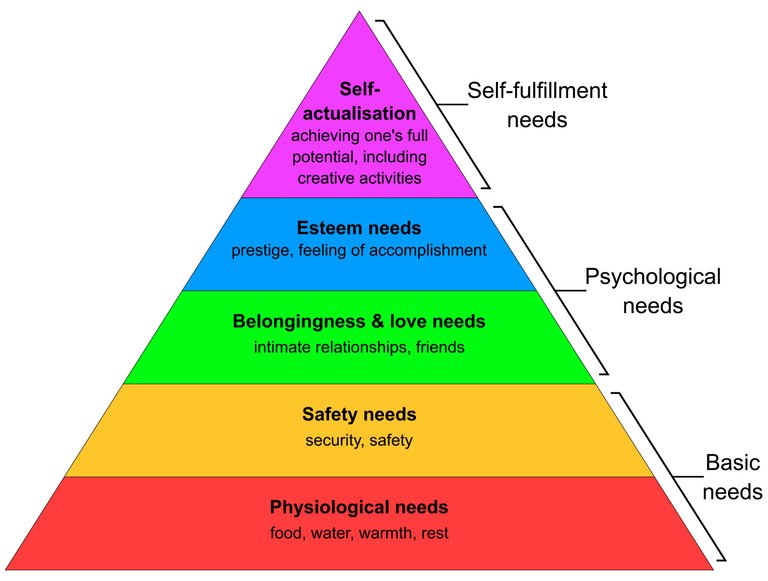
We will briefly go through all the levels of Maslow's hierarchy of needs and provide a summary of the author's work. We also recommend reading the article "A Theory of Human Motivation" by A. H. Maslow. In his later years, the author expanded the hierarchy of needs with several additional levels, but in this article, we will focus on the simplified version.
A person who lacks food, safety, love, and respect is likely to crave food more than anything else.

Simplified Hierarchy of Needs. Source
As one basic need is satisfied, a person's entire philosophy of life changes. During a period of extreme hunger, happiness might seem to hinge solely on being in a place with abundant food, with no concern for safety, social fulfillment, or aesthetics. However, once this need is met, all of the body's resources are redirected toward the next, higher-order need in the hierarchy of needs.
According to Maslow's theory, a person's motivation changes depending on their current level within the pyramid. The driving forces are unmet needs.
It’s also important to understand that this is merely a theory, not a law of gravity that works in 100 out of 100 cases. This theory has been repeatedly criticized within the scientific community. Humans differ from animals in possessing reason and intellect, so in some cases, this theory may not apply. However, if we consider current events around the world and analyze them through the lens of Maslow’s Pyramid, certain conclusions can be drawn. I encourage you to make those conclusions for yourself.
Physiological Needs
Physiological needs of the body, if unmet, such as hunger, become the determining factor for all its actions. All the body’s resources, along with those under its control (intellect, memory, habits), are subordinated to one directive — find food and satisfy hunger. In this state, anything that does not serve this goal (political events, history, education, travel plans, buying a new pair of shoes, etc.) ceases to exist. According to Maslow's theory, a person's worldview changes, and in a state of extreme hunger, the highest sense of success and happiness would be to be in a place with abundant food.
As soon as one physiological need is satisfied, other ("higher") needs immediately arise, and these, rather than physiological hunger, dominate the body. And once those are satisfied, new (even "higher") needs emerge, and so on. This is what Maslow meant when he wrote that basic human needs are organized in a hierarchy of relative dominance.
Need for Safety
Once all of a person’s physiological needs are met, the body switches to a mode of seeking safety. Everything described in the previous section applies almost equally to this need. In other words, the human body becomes a mechanism focused on finding safety.
For example, in areas where military conflict occurs, the only goal of people is to leave the area or, at the very least, find temporary shelter where they can wait out the shelling. This is clearly reflected in the number of refugees leaving countries where armed conflict begins. Often, people abandon all their possessions, including documents, and flee to safer places. It’s unlikely that people experiencing such circumstances will be concerned with high-level philosophical discussions or consider that green energy will save the world. Another example is a serious illness: in this case, all available resources will be directed toward fighting the disease, and everything else becomes irrelevant.
Need for Belonging (Social Connections) and Love
When a person’s physiological and safety needs are satisfied, they move on to the next level — the need for love and social connections. Essentially, humans are social beings. Almost everyone values having social connections — meeting friends, talking, listening, seeking advice — but it’s also important to have affection and love (to love and be loved). Family, children, parents, friends — these are all aspects that define and are attributes of a person in a society where basic physiological and safety needs are met.
Partially, this need can be fulfilled through social networks — lively and active discussions, conversations about interests, flirting.
Need for Esteem (Reputation/Status)
Abraham Maslow wrote his article in 1943, long before social networks existed, but how right he was.
All people in our society (with a few pathological exceptions) have a need or desire for a stable, firmly based, (usually) high evaluation of themselves, for self-respect, or self-esteem, and for the esteem of others. By firmly based self-esteem, we mean that which is soundly based upon real capacity, achievement and respect from others. These needs may be classified into two subsidiary sets. These are, first, the desire for strength, for achievement, for adequacy, for confidence in the face of the world, and for independence and freedom. Secondly, we have what we may call the desire for reputation or prestige (defining it as respect or esteem from other people), recognition, attention, importance or appreciation.
Around 80 years have passed, and what do we see in social networks? A very vivid example of the relevance of this information can be observed in social media, where people put their lives on display for everyone to see, sometimes embellishing events to present them in a favorable light. People strive to gain respect, recognition, and demonstrate their status. What do you think happens to the self-esteem of an attractive woman or young man after receiving hundreds of comments under a photo? People experience the need for recognition from society.
This can also serve as motivation for certain actions, where recognition comes not for a pretty photo, but for hard work, a good deed, helping those in need, and so on.
The internet and social networks have significantly simplified the ways to fulfill this need. One can do certain work sitting at a computer and receive recognition from individuals or entire social groups in return.
The need for self-actualization
There is no specific description for this. The essence is that when a person’s basic needs (listed earlier) are fulfilled, they begin to feel dissatisfaction if they are not growing or self-actualizing. This can probably be described as career advancement; if a person is engaged in creativity, it would involve deepening their skills, knowledge, and overall development. In other words, it’s about overcoming greater challenges in the field the person is involved in and reaching a new level.
The clear emergence of these needs rests upon prior satisfaction of the physiological, safety, love and esteem needs. We shall call people who are satisfied in these needs, basically satisfied people, and it is from these that we may expect the fullest (and healthiest) creativeness. Since, in our society, basically satisfied people are the exception, we do not know much about self-actualization, either experimentally or clinically. It remains a challenging problem for research.
If a person is at this level of Maslow's pyramid, they are the most productive in terms of self-realization. All basic needs are met, and the individual can focus on challenging, large-scale tasks.
The preconditions for the basic need satisfactions. -- There are certain conditions which are immediate prerequisites for the basic need satisfactions. Danger to these is reacted to almost as if it were a direct danger to the basic needs themselves. Such conditions as freedom to speak, freedom to do what one wishes so long as no harm is done to others, freedom to express one's self, freedom to investigate and seek for information, freedom to defend one's self, justice, fairness, honesty, orderliness in the group are examples of such preconditions for basic need satisfactions. Thwarting in these freedoms will be reacted to with a threat or emergency response. These conditions are not ends in themselves but they are almost so since they are so closely related to the basic needs, which are apparently the only ends in themselves. These conditions are defended because without them the basic satisfactions are quite impossible, or at least, very severely endangered.
Is what is highlighted in bold in the quote above relevant to where you live? If yes, and if no, does this affect the fulfillment of your basic needs? Does the presence or absence of these freedoms in society make society better or worse? In other words, does the satisfaction of basic needs in society have a direct impact on the social system, and is the cause rooted in freedoms? Does the violation or limitation of such freedoms happen intentionally, and is it beneficial for the social system, or the opposite? What are the consequences of violating freedoms?
In his article, Maslow describes that the hierarchy of the "pyramid" does not always work sequentially for individuals, meaning the levels can shift. For example...
In certain people the level of aspiration may be permanently deadened or lowered. That is to say, the less pre-potent goals may simply be lost, and may disappear forever, so that the person who has experienced life at a very low level, i. e., chronic unemployment, may continue to be satisfied for the rest of his life if only he can get enough food.
Motivation according to Maslow's theory
Maslow argues that higher-order motivation arises only after the previous level of needs is fulfilled. In other words, if a person is at the level of physiological needs, they will not be motivated by the need for self-realization. To move on to higher-order motivation, it is necessary to fully or partially (to a large extent) satisfy the previous need.
We hope that this article has been useful and that you haven’t wasted a few minutes of your time. It would be interesting to discuss this theory in the comments. How would you characterize it — as something that works, or rather not? Do basic human needs determine a person’s life path, or are they secondary and have little impact?
The following sources of information were used in the writing:
https://en.wikipedia.org/wiki/Maslow%27s_hierarchy_of_needs
https://psychclassics.yorku.ca/Maslow/motivation.htm
Congratulations @detectblock! You have completed the following achievement on the Hive blockchain And have been rewarded with New badge(s)
Your next target is to reach 20 posts.
You can view your badges on your board and compare yourself to others in the Ranking
If you no longer want to receive notifications, reply to this comment with the word
STOPCheck out our last posts: